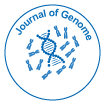Holistic Study of Whole Genomes
Received Date: Dec 09, 2017 / Accepted Date: Dec 11, 2017 / Published Date: Dec 14, 2017
Abstract
Two complementary goals of biological research are to understand how each organism works and how that relates to other organisms. Specifically, the function of all genes and non-genes (i.e., all the regions of a genome that do not code for any genes) of each organism and how its genes and non-genes compare with those of other organisms. The progress in DNA sequencing has generated large amounts of sequence data, and many computer programs have been developed to interpret these data, especially in identifying and analyzing the similarities among genes and genomes. Unfortunately, in the zeal of finding similarities, the differences among genes and genomes are often not just simply ignored, but intentionally masked, trimmed, or filtered. With the increase in the number of genes or organisms being compared, the deleted data increase exponentially.
Keywords: Genome; DNA sequencing; Mutations; Processing; Organism
Citation: Tan CL (2017) Holistic Study of Whole Genomes. J Genome 1: e102.
Copyright: ©2017 Tan CL. This is an open-access article distributed under the terms of the Creative Commons Attribution License, which permits unrestricted use, distribution, and reproduction in any medium, provided the original author and source are credited.
Share This Article
Open Access Journals
Article Usage
- Total views: 5467
- [From(publication date): 0-2018 - Apr 01, 2025]
- Breakdown by view type
- HTML page views: 4438
- PDF downloads: 1029
